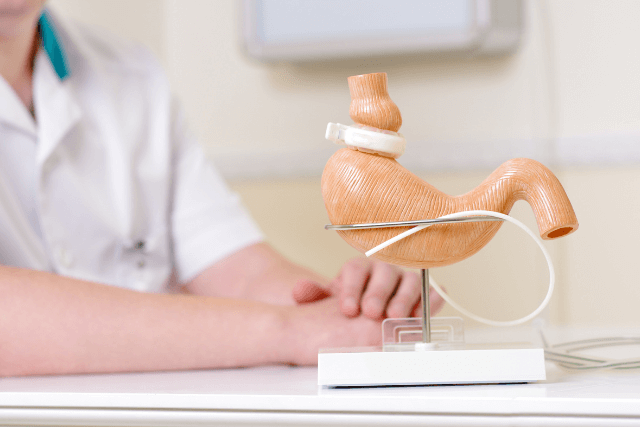Undergoing weight loss surgery or procedures can be a transformative step toward better health. However, the journey doesn’t end with the procedure. Maintaining weight loss results after surgery requires a combination of lifestyle changes, consistent habits, and ongoing support. This guide provides evidence-based strategies to help you sustain your weight loss and improve your overall well-being.
The Importance of Maintaining Weight Loss
Achieving significant weight loss through surgery is a remarkable accomplishment. Yet, studies indicate that many individuals regain weight within a few years post-surgery. For instance, research suggests that after 10–14 years, 60% of excess weight loss has been maintained by patients . Therefore, adopting sustainable habits is crucial for long-term success
1. Adopting a Balanced, Nutrient-Rich Diet
After surgery, your body needs nutrients to heal and maintain weight loss. Therefore, focus on:
High-Protein Foods:
- Incorporate lean meats, eggs, tofu, and legumes.
- This helps support muscle mass and recovery.
Fruits and Vegetables:
- Aim for a variety of colors.
- By doing so, you provide essential vitamins, minerals, and antioxidants.
Whole Grains:
- Choose quinoa, brown rice, and oats.
- These offer long-lasting energy and satiety.
Healthy Fats:
- Include avocados, nuts, and olive oil in moderation.
- However, avoid excess to maintain calorie balance.
In contrast, limit or avoid:
- Sugary snacks
- Fried foods
- Processed meats
Ultimately, focusing on these foods ensures proper nutrition, supports healing, and helps in maintaining weight loss results after surgery.
2. Incorporating Regular Physical Activity in Maintaining Weight Loss Results
Exercise plays a pivotal role in maintaining weight loss. Engage in:
- Cardiovascular Activities: Walking, cycling, or swimming to improve heart health.
- Strength Training: Building muscle mass can boost metabolism and aid in fat loss.
- Flexibility Exercises: Yoga or stretching to enhance mobility and reduce stress.
Aim for at least 150 minutes of moderate-intensity exercise per week, as recommended by health authorities .
3. Monitoring Portion Sizes and Eating Habits
Post-surgery, your stomach capacity is reduced, making portion control essential. Practice mindful eating by:
- Eating Slowly: Take time to chew food thoroughly and savor each bite.
- Avoiding Distractions: Limit screen time during meals to focus on satiety cues.
- Listening to Your Body: Stop eating when you feel satisfied, not full.
These habits can prevent overeating and support weight maintenance .
4. Staying Hydrated
Proper hydration is vital for overall health and can aid in weight maintenance. Drink water throughout the day and limit beverages high in sugar or calories. Avoid drinking large amounts of fluids immediately before or during meals to prevent discomfort and ensure adequate nutrient absorption .
5. Seeking Emotional and Psychological Support
Emotional well-being significantly impacts weight maintenance. Consider:
- Therapy or Counseling: Address emotional eating triggers and develop coping strategies.
- Support Groups: Connect with others who have undergone similar experiences for motivation and shared insights.
- Stress Management Techniques:Additionally, practice mindfulness, meditation, or deep-breathing exercises to effectively reduce stress levels.
Engaging in these practices can help maintain a healthy relationship with food and support long-term success .
6. Regular Medical Follow-Ups
Ongoing medical supervision is crucial because it ensures that any potential issues are addressed promptly. Moreover, regular check-ups can help you maintain your health by allowing you to:
- Monitor Nutrient Levels: By checking regularly, you can ensure you are not deficient in essential vitamins and minerals.
- Assess Weight Trends: This helps you identify any early signs of weight regain before they become significant.
- Adjust Medications: Consequently, your healthcare team can modify any prescriptions as needed to support your health goals effectively.
In addition, collaborating closely with your healthcare team is essential for sustained weight loss, and furthermore, it provides the guidance and accountability necessary to maintain long-term results.
Conclusion: Maintaining Weight Loss Results
Maintaining weight loss results after surgery or procedures requires dedication and a multifaceted approach. Therefore, by adopting a balanced diet, consistently staying active, carefully monitoring eating habits, and actively seeking support, you can significantly improve your chances of long-term success. Additionally, by attending regular medical check-ups and avoiding common pitfalls, you can not only sustain your weight loss but also enjoy a healthier, more fulfilling life. These strategies help reinforce positive habits, which ultimately lead to lasting results.



